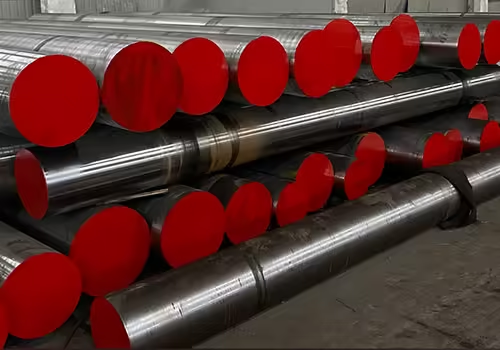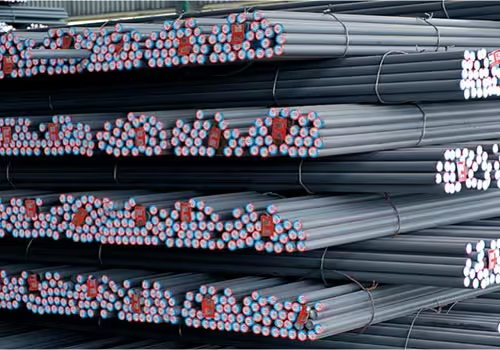
What is 4140 Steel? 4 Key Benefits for Heavy Equipment Manufacturing
Table of Contents
Introduction

4140 steel, a high-strength alloy steel, is widely used across various heavy equipment manufacturing industries due to its exceptional mechanical properties. Often found in parts such as gear shafts, machine components, and tools, this versatile steel plays a crucial role in ensuring durability and performance in demanding applications. In this article, we will explore what 4140 steel is, its four key benefits for heavy equipment manufacturing, and how it stands out against other alloy steels such as SAE 4130 and A36. At Henan Jiyuan Iron & Steel (Group) Co., Ltd., we specialize in producing high-quality 4140 steel, ensuring that it meets the strict standards required by industries worldwide.
What is 4140 Steel?
4140 steel, also referred to as chromium-molybdenum steel, is an alloy made by combining chromium, molybdenum, and carbon with iron. This unique combination of elements grants the steel a balance of high strength, toughness, and resistance to wear and corrosion. When heat-treated, 4140 steel can achieve an even higher level of hardness and strength, making it suitable for components that experience constant wear or need to withstand high mechanical loads.
Key properties of 4140 steel include:
- Tensile Strength: High strength makes it ideal for structural components.
- Ductility: Provides flexibility while maintaining strength under stress.
- Wear Resistance: Protects parts from abrasion in heavy-duty applications.
- Hardness: Achieved through heat treatment, making the material resistant to deformation.
This alloy is highly versatile and can be used in a variety of applications that require high performance under harsh conditions.
1. How 4140 Steel Enhances Durability in Heavy Equipment Manufacturing
The primary advantage of 4140 steel in heavy equipment manufacturing lies in its exceptional durability. Heavy machinery used in construction, mining, and industrial sectors is regularly exposed to extreme conditions, including high temperatures, abrasive environments, and constant mechanical stress. These conditions place considerable demands on the materials used, which must endure continuous wear and tear without failure. This is where 4140 steel excels, offering remarkable toughness and performance under the most severe conditions.
High Tensile Strength and Wear Resistance
One of the key features of 4140 steel is its high tensile strength, which allows it to withstand significant stress without breaking or deforming. This characteristic is particularly important in heavy equipment manufacturing, where components such as drive shafts, crankshafts, gears, hydraulic cylinders, and bolts are subjected to frequent and heavy loads. The wear resistance of 4140 steel further contributes to its durability, ensuring that machinery components can function optimally over long periods without degrading.
Real-World Applications
- Drive Shafts: In heavy-duty vehicles and machinery, drive shafts transfer torque to power different components. 4140 steel provides the strength needed to withstand the stress and rotational forces encountered during operation.
- Crankshafts: These are critical components in many machines, converting linear motion into rotational motion. The impact resistance and fatigue resistance of 4140 steel ensure that crankshafts remain durable and perform reliably, even under constant operation.
- Gears: 4140 steel is highly favored in gear manufacturing due to its ability to resist wear and deformation. Whether in excavators, bulldozers, or other industrial machinery, gears made from 4140 steel ensure the equipment operates smoothly without frequent breakdowns.
- Hydraulic Cylinders: Hydraulic systems require high-strength, durable materials to withstand high pressures. 4140 steel is an excellent choice for manufacturing hydraulic cylinders, providing the necessary strength and resistance to fatigue.
- Bolts and Fasteners: In heavy equipment, where large and heavy parts must be secured, 4140 steel provides the necessary tensile strength for fasteners that hold components together, ensuring secure and safe operation.
By maintaining its integrity even after extended exposure to high-stress environments, 4140 steel helps reduce downtime and repair costs. This durability not only ensures the reliability of equipment but also contributes to a longer service life for machinery, ultimately lowering the frequency of part replacements and repairs.lity not only ensures the reliability of equipment but also helps businesses save on maintenance and replacement costs.
2. 4140 Steel vs. SAE 4130 Steel: Which One Holds Up Better Under Stress?

When comparing 4140 steel to other commonly used alloy steels, such as SAE 4130, it’s crucial to understand the differences in their chemical composition and resulting mechanical properties. Both materials are widely used in manufacturing industrial components, but 4140 steel generally outperforms SAE 4130 steel in high-stress applications due to its superior mechanical properties.
The Key Differences Between 4140 and SAE 4130 Steel
Both 4140 steel and SAE 4130 steel are part of the chromium-molybdenum family of alloy steels. However, 4140 steel typically contains slightly higher levels of chromium and molybdenum compared to SAE 4130 steel. This additional alloying content imparts enhanced strength, hardness, and wear resistance to 4140 steel, making it better suited for heavy-duty applications.
Comparison Table: 4140 Steel vs. SAE 4130 Steel
| Property | 4140 Steel | SAE 4130 Steel |
|---|---|---|
| Tensile Strength (MPa) | 930 | 620 |
| Yield Strength (MPa) | 690 | 460 |
| Hardness (HB) | 170-235 | 120-180 |
| Elongation (%) | 25 | 20 |
| Impact Toughness (J) | High | Medium |
| Fatigue Resistance | Excellent | Good |
As shown in the table, 4140 steel boasts superior tensile strength, yield strength, and impact toughness compared to SAE 4130 steel. This makes 4140 steel the better choice for applications that involve continuous or high-intensity stress, such as in heavy-duty industrial equipment. When operating in harsh environments, machinery parts made from 4140 steel exhibit higher resistance to impact and fatigue, making them more durable and less prone to failure than those made from SAE 4130 steel.
Choosing 4140 steel over SAE 4130 steel for manufacturing critical machinery components ensures longer-lasting performance and better resistance to wear and tear, even in the most demanding applications. can result in components that last longer and perform better under extreme pressure and impact.
3. Why 4140 Steel is Essential for Manufacturing Heavy Machinery Components

The versatility of 4140 steel makes it an indispensable material in the heavy equipment manufacturing sector. Heavy machinery components are often exposed to extreme conditions such as high torque, shock loading, and high mechanical stresses. 4140 steel is specifically engineered to handle these demanding conditions and offers various benefits for parts that need to perform reliably under such stress.
High Strength-to-Weight Ratio
One of the key advantages of 4140 steel is its high strength-to-weight ratio. This feature is especially valuable when manufacturing parts that need to be both strong and lightweight, such as in excavator arms or bulldozer frames. 4140 steel allows manufacturers to produce high-performance components that are both durable and efficient without adding unnecessary weight to the equipment.
Enhanced Toughness and Absorbing Energy
4140 steel also provides excellent toughness, meaning it can absorb significant amounts of energy without fracturing. This is particularly beneficial in components that are subjected to dynamic loads and shock, such as hydraulic components or shovel arms in mining equipment. The toughness of 4140 steel ensures that even under impact or rapid deformation, the material remains intact, preventing premature failure.
Excellent Wear Resistance
For parts that are exposed to continuous friction and abrasion, such as gears, bearings, and bushings, 4140 steel is the ideal choice due to its superior wear resistance. The material’s ability to resist wear and tear ensures that components maintain their functionality for extended periods, reducing the need for frequent replacements and minimizing maintenance downtime.
For Henan Jiyuan Iron & Steel (Group) Co., Ltd., we ensure that the 4140 steel products we provide meet the exact specifications required for heavy equipment manufacturing, ensuring that machinery operates efficiently in the toughest conditions while minimizing maintenance and downtime.
4. How 4140 Steel Reduces Maintenance Costs in Heavy Machinery
Maintenance is one of the largest operational costs in the heavy equipment industry. With machinery subjected to constant wear and tear, frequent repairs and component replacements can quickly add up. 4140 steel offers a cost-effective solution by significantly extending the lifespan of components, ultimately reducing the overall maintenance expenses.
Increased Durability and Longevity
The increased durability of 4140 steel results in a longer service life for machinery components. Parts made from 4140 steel are less likely to suffer from wear, fatigue, or corrosion, even under harsh operating conditions. This durability reduces the frequency of part replacements and repairs, saving businesses significant amounts in labor and material costs.
Lower Downtime and Increased Productivity
With fewer repairs and replacements, machinery can remain in operation longer, leading to reduced downtime and increased productivity. The improved performance of components made from 4140 steel ensures that the equipment runs efficiently for extended periods, reducing disruptions in the manufacturing process.
Reduced Maintenance Costs Over Time
By using 4140 steel, manufacturers can significantly reduce the long-term maintenance costs of heavy machinery. The wear resistance and fatigue resistance of 4140 steel contribute to a longer life cycle for components, meaning businesses don’t need to spend as much on replacements and repairs, leading to greater cost-effectiveness over time.
In the long run, adopting 4140 steel for heavy equipment manufacturing is a smart investment that ensures machinery operates efficiently while reducing operational costs.
Conclusion
4140 steel is undoubtedly one of the best materials available for heavy equipment manufacturing, providing superior strength, durability, and performance under extreme conditions. Whether you’re producing gears, shafts, or other high-stress components, 4140 steel ensures your equipment can withstand the toughest tasks without compromising on quality.
At Henan Jiyuan Iron & Steel (Group) Co., Ltd., we are committed to delivering high-quality 4140 steel products that meet international standards and cater to the diverse needs of heavy equipment manufacturers. With our advanced technology and years of expertise, we are the trusted partner for manufacturers seeking reliable, durable steel materials.
For more information on our 4140 steel products or to request a quote, feel free to contact us today. Our team is ready to help you with your specific needs and provide the best steel solutions for your heavy equipment manufacturing projects.
FAQ
What is 4140 steel used for?
4140 steel is commonly used for manufacturing components that require high strength, durability, and wear resistance, such as gears, shafts, axles, and hydraulic cylinders in heavy machinery and industrial equipment.
How does 4140 steel compare to A36 steel?
4140 steel offers higher tensile strength, better wear resistance, and superior impact toughness compared to A36 steel, making it a better choice for heavy-duty applications that experience high stress and abrasion.
What industries use 4140 steel?
4140 steel is widely used in industries such as construction, mining, automotive, aerospace, and manufacturing, where high-strength and durable materials are essential for machinery and components.
Can 4140 steel be heat-treated?
Yes, 4140 steel is heat-treatable, which allows it to achieve higher hardness and strength, making it even more suitable for demanding industrial applications.
What industries use 4140 steel?
4140 steel is widely used in industries such as construction, mining, automotive, aerospace, and manufacturing, where high-strength and durable materials are essential for machinery and components.
How does 4140 steel reduce maintenance costs?
The superior durability and wear resistance of 4140 steel reduce the need for frequent repairs and component replacements, helping businesses save on maintenance costs and minimize downtime.






